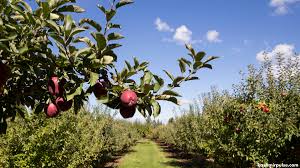Srinagar, Feb 15: Panic has gripped apple growers following the prolonged dry season and unusual rise in temperatures.
Horticulturists say the unusual weather pattern could harm the produce and tree health.
After heavy snowfall on December 27 last year, the valley plains have majorly experienced a prolonged dry winter, which has led to fears of significant consequences for the apple industry.
In addition to the lack of snowfall and precipitation, temperatures have risen above normal levels, further amplifying the concerns of farmers.
Apple growers have expressed concern over the changing climate, as the prolonged dry spell and unseasonably high temperatures threaten the health of their crops. According to them, the dry winter season increases the risk of diseases in apple plants, as the lack of moisture weakens the trees and makes them more susceptible to pests and infections.
“We have been witnessing the impact of dry winters for the last few years. There is a complete lack of moisture, and orchards are dry. It is detrimental to the health of an apple tree, which needs abundant moisture during winter months to sustain dry summers,” said Mohammad Akbar Dar, an apple grower and dealer.
He said the quality of produce gets affected due to the dry winters. “It also attracts rodents, which damage trees. The quality of apples gets affected when the plant doesn’t get abundant moisture during winter,” Dar said.
According to apple growers, the dry winter season increases the risk of diseases in apple plants, as the lack of moisture weakens the trees and makes them more susceptible to pests and infections.
Furthermore, the rising temperatures are causing the apple trees to blossom earlier than usual, which is also detrimental to the industry.
“Early blooming can expose the delicate flowers to frost, damaging the potential harvest. If this trend continues, it could lead to a significant reduction in the yield,” said Abdul Ahad Dar, another apple dealer.
Experts said that the valley requires a few more spells of snow and rain for healthy apple and mustard produce.
“The combination of dry conditions and higher-than-normal temperatures could also impact the quality of the apple produce, as stressed trees are less likely to produce the high-quality fruit that the region is known for. We usually get less rain during summer, and it is the groundwater recharge during winters that suffices the water needs of apple trees,” said Irshad Ahmad Bhat, a botanist.
